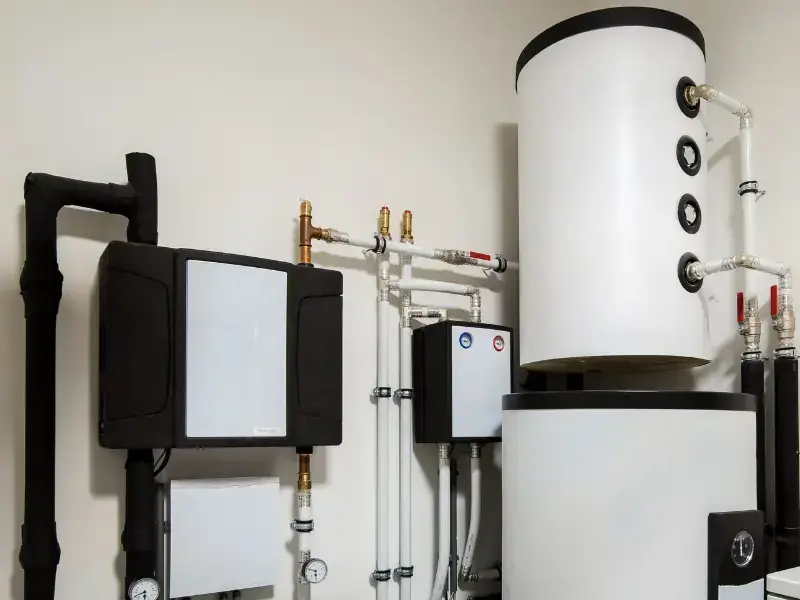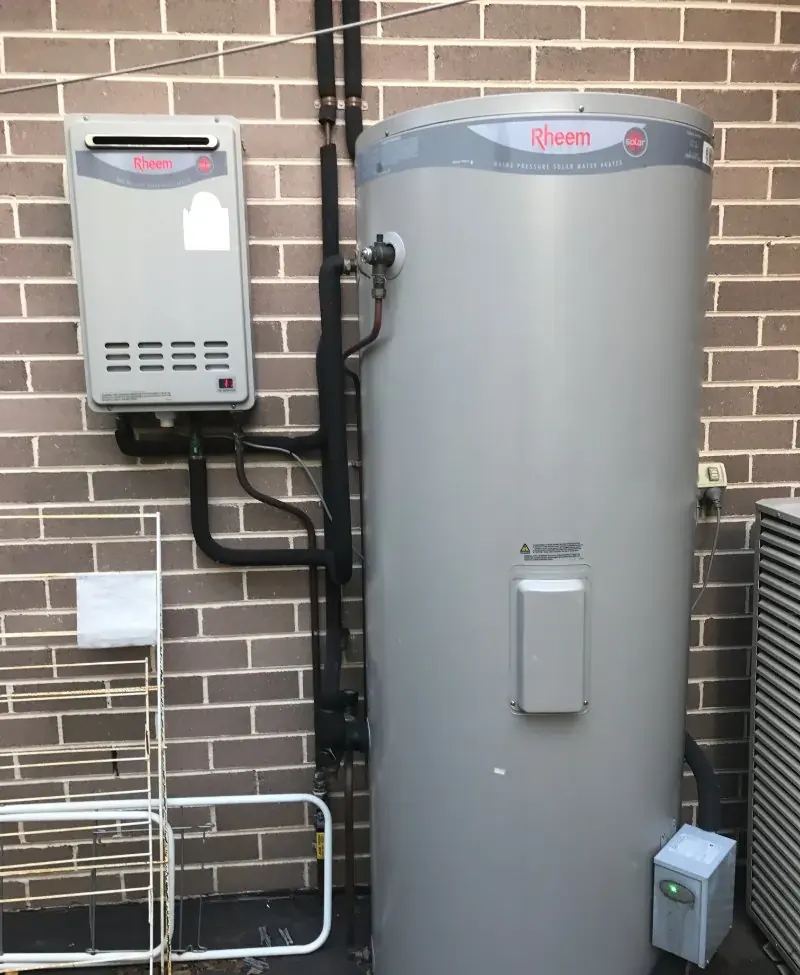Heat Pump or Solar Hot Water
Considering installing a new hot water system or upgrading your current hot water system to either a heat pump or solar option? With each having advantages and disadvantages, you may find it challenging to make a decision when it comes to the best option for your home or business. Heat pumps and Solar hot water systems are known for being energy efficient and cost-effective, but what else should you know about each system before you choose? We have put together a brief overview of each for guidance.
Heat Pump Hot Water Systems - Pros and Cons
There are many advantages to installing a heat pump system, they can significantly lower your energy consumption and reduce your environmental impact, making them an ideal option for both homes and businesses. Heat pump hot water systems come in two types classed as integrated and split. The integrated system is a single unit, while the split system consists of a tank and a separate compressor. Both work in the same way, with the main difference being their size and weight.
Heat Pump Hot Water Systems Advantages:
- Energy Efficiency - Heat pump systems are highly efficient because they transfer heat rather than generating it. This means they use a fraction of the electricity that conventional systems do to produce the same amount of hot water.
- Lower Operating Costs - Heat Pumps consume less energy to heat water, therefore have lower running costs compared to electric or gas water heaters.
- Environmentally Friendly- Heat pump water heaters produce fewer carbon emissions compared to conventional systems that rely on gas or electric resistance heating.
- Extended Lifespan - Heat pump systems tend to have a longer lifespan than traditional electric or gas water heaters, often lasting 10-15 years or more with regular services.
- Ideal for Warmer Climates - Heat pumps work efficiently in warmer climates as they extract heat from the surrounding warm air.

Heat Pump Hot Water System Disadvantages:
Despite the disadvantages listed, the energy savings and long-term benefits of installing a heat pump hot water system typically outweigh the disadvantages. Particularly for those living in warmer climate zones, where the system will be reliable and economical, operating efficiently year-round. Disadvantages include
- Higher Initial Cost Heat pump hot water systems generally have a higher upfront cost compared to traditional water heaters, making them a barrier for some homeowners.
- Efficiency Heat pumps rely on warm air to extract heat; therefore, in cooler climates, their efficiency can decrease, leaving you with insufficient water temperature.
- NoiseHeat pump systems can be noisier than traditional water heaters due to the sound the compressor and fan produce. If the system is installed near living spaces or bedrooms, it may be disruptive.
- Frost Build-upIn very cold climates, the outdoor unit of a heat pump can accumulate frost, reducing efficiency. Look for systems that come with a defrost cycle to help avoid this from happening.
- Space RequirementsFor homes with limited space, heat pump systems may not be suitable, as they need room for the compressor and tank.
- Longer Heating TimeHeat pump systems may take longer to heat water as they work by transferring heat from the air to the water, and this can take time.
- Dependence on ElectricityAlthough heat pump systems are energy-efficient, they still require electricity to operate. If you have an unreliable power supply or high electricity costs, the benefits of switching to a heat pump system may not be warranted.
- Installation ComplexityThe installation often requires a licenced plumber with experience in setting up heat pump technology to ensure it works efficiently.
Solar Hot Water - Pros and Cons
Solar has become a popular and smart choice of heating for many Australian homes over the years. With the beautiful warm climate and abundant sunlight, solar offers renewable energy and eco-friendliness. If you're looking to reduce reliance on fossil fuels, lower greenhouse gas emissions and overall make a difference in environmental impact, a solar hot water system is the way to go.
Solar Hot Water Systems Advantages
- Low Operating Costs Solar hot water systems have minimal ongoing costs since they rely on the sun’s energy. Once installed, they require little to no energy from traditional power sources.
- Environmental BenefitsSolar hot water systems are a clean and renewable and eco-friendly source of energy,
- Consistent and Reliable Performance With the right setup, you can meet your household’s hot water needs year-round, particularly in areas with consistent sunlight.
- Energy Independence Solar energy will help you reduce your dependence on external power sources and avoid rising energy prices or supply issues.
- Low Maintenance - Solar hot water systems require very little maintenance, and repair services and can last for at least 15 to 25 years or more as opposed to other water heating systems.
- Government IncentivesMany governments offer rebates, tax credits, and other incentives to encourage the use of solar hot water systems more affordable for property owners.
- Long-Term SavingsWith minimal maintenance and virtually no running costs, they provide excellent long-term value.
- Increased Property ValueHomes with solar hot water systems may see an increase in value, as buyers are often attracted to energy-efficient and environmentally friendly features.
- Energy Efficiency and Sustainability Solar water heaters are highly efficient and contribute to a more sustainable way of living, particularly in sunny regions.

Solar Hot Water System Disadvantages
- High Initial CostThe upfront cost of purchasing and installing a solar hot water system can be higher and more complicated than traditional water heaters, often requiring professional installation. Particularly if structural or electrical adjustments are required, which can make the process more time-consuming and expensive.
- Weather Dependence - Solar hot water systems rely on sunlight to generate heat. Therefore, on frequent cloudy days, limited sunlight, or during the winter months, the system’s efficiency may decrease, potentially leading to insufficient hot water supply.
- Maintenance CostsWhile solar hot water systems have relatively low-maintenance requirements, occasional maintenance, such as cleaning the panels and checking for wear and tear, is recommended. Additional costs may be incurred if components need repair or replacement.
- Limited Hot Water Supply A solar hot water system may struggle to meet demand. if your household uses a large amount of hot water at once. On cloudy or overcast days that last for extended periods, a booster system might be necessary.
For personalised hot water solutions, consult the experts for a clearer understanding of your options and benefits.